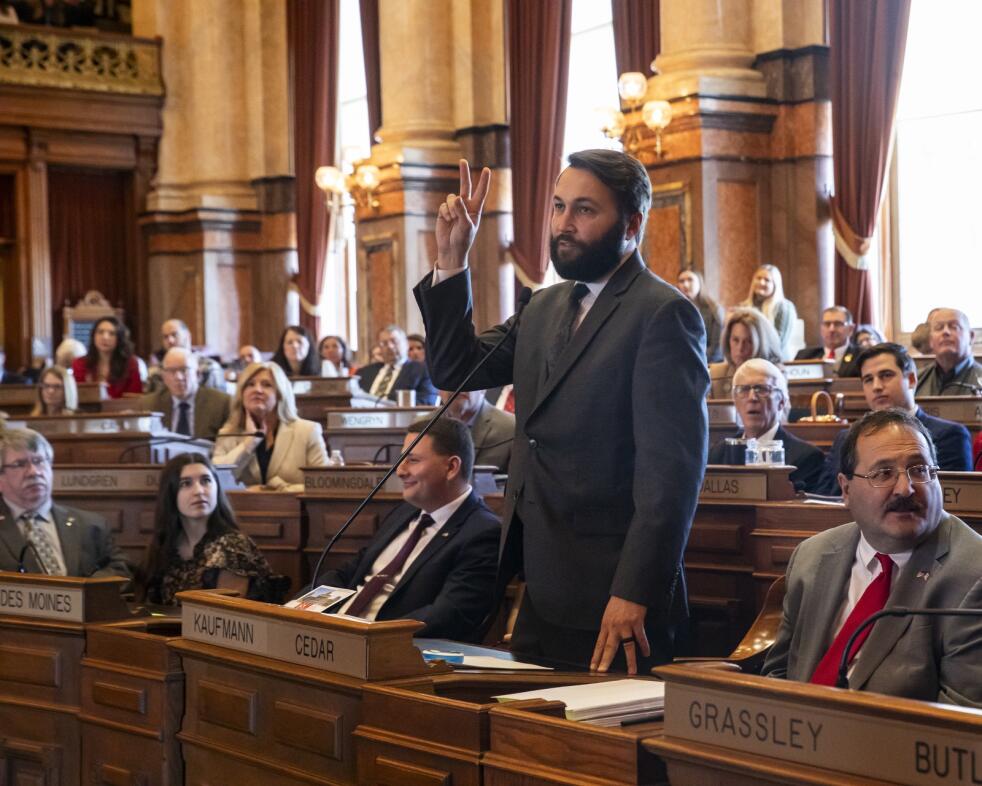The Gazette offers audio versions of articles using Instaread. Some words may be mispronounced.
DES MOINES — Beginning next week, Iowa lawmakers are expected to again consider a moratorium blocking the Iowa Racing and Gaming Commission from awarding new gaming licenses in Iowa, which would thwart Cedar Rapids casino backers’ hopes for a new $275 million facility.
Rep. Bobby Kaufmann, R-Wilton, chair of the House tax policy Ways and Means Committee, said he plans to hold a subcommittee hearing next week on a bill, which had yet to be filed as of Wednesday afternoon.
Kaufmann said he intends to file a bill this week that largely will mirror one that quickly passed the Iowa House with bipartisan support in the waning, early morning hours on the last day of the 2024 legislative session. The Iowa Senate, however, adjourned without taking up the measure.
Kaufmann said the bill, similar to last year’s version, would enact a five-year moratorium on issuing new casino licenses in the state, through June 30, 2030. It also would spell out criteria that the Iowa Racing and Gaming Commission would use to consider future casinos, including whether and how much it would drain revenues from existing gambling facilities in Iowa.
The Iowa Racing and Gaming Commission twice has rejected proposals — in 2014 and 2017 — to bring a casino to Cedar Rapids.
The state later implemented a two-year moratorium on new gaming licenses. That moratorium expired July 1, 2024, allowing Cedar Rapids casino backers to move ahead with their third attempt at securing a Linn County gaming license.
“I’m not leaving it up to chance,” Kaufmann said.
He pointed to two new market studies commissioned by the gaming commission that say a proposed Cedar Rapids casino would largely rely on pulling patrons from other Iowa casinos rather than bringing in new customers or significantly increasing statewide gaming revenue.
A moratorium, Kaufmann said, is needed to prevent job losses, business closures and strain on local government and nonprofit budgets due to reduced tax and grant revenue from existing casinos being “gutted financially by a new casino.”
“That is unacceptable to me, particularly given the proximity that many of our members have to existing casinos, where people have really good paying jobs and careers they’ve been banking on that would go away if this were to not pass,” he said.
The state’s existing casinos support a moratorium, saying Iowa’s casino market — with 19 commercial casinos and four tribal casinos spread across the state — is saturated and that a new facility would cannibalize revenues from other Iowa casinos and dilute the state’s gambling market.
Casino backers say the state’s second-largest city should be allowed to benefit from gaming the same as other communities, and that growth in Iowa’s gaming industry and competition from neighboring states could make the proposed Cedar Crossing Casino more relevant.
Cedar Rapids Mayor Tiffany O’Donnell, who met with lawmakers earlier this week, emphasized the $60 million in projected new gaming revenue for the state that a Cedar Rapids casino would generate.
O’Donnell also stressed the new studies show higher revenue and lower cannibalization from a Cedar Rapids casino than did previous studies.
The projected impact to existing Iowa casinos also is significantly less than what was projected when the state granted a license for Wild Rose Hotel & Casino in Jefferson, Linn County casino backers argue. They also contend the cannibalization projections were overestimated, and new casinos force others to improve their offerings.
“All we’re asking for is a fair shot,” O’Donnell told The Gazette. “ … We’re just asking the Legislature to get out of the way and let the process take place as intended,” O’Donnell said. “ … Like the rest of business, we need to always be looking for ways to innovate rather than leaning on politics to protect (casino) coffers.”
Senate President Amy Sinclair, R-Allerton, said Wednesday that it was too early to make any predictions on what will happen in the Senate, as a bill had not yet been drafted and nothing had been introduced in the Senate.
Sinclair previously told The Gazette she has her own reservations about advancing a moratorium.
Kaufmann said he has been “having good conversations” with the Senate. “I will not tell you they’ve told me, ‘Yes,’ but I’ll tell you they have not told me, ‘No,’” he said.
Kaufmann said he’ll convene a subcommittee of himself and Reps. Sami Scheetz, D-Cedar Rapids; David Jacoby, D-Coralville; Carter Nordman, R-Panora; and Brent Siegrist, R-Council Bluffs.
Kaufmann said he expects a full committee vote on the bill shortly after the subcommittee meeting, likely within the next two weeks.
Lawmakers have a short window to pass and have Gov. Kim Reynolds’ sign a moratorium into law. The five-member gaming commission is set to vote Feb. 6 on awarding a license for a Linn County casino.
“I think it’s really important for us as a state to think about overall gaming revenue, especially when some of the people that are pushing this legislation — talking about casino owners — are building casinos in Nebraska that are directly competing with Iowa gaming operations,” Scheetz said. “And so the Racing and Gaming Commission is looking at this overall. It’s taking into account cannibalization. It’s taking into account new gaming revenue that the Cedar Rapids casino would bring.
“I think competition is healthy. I think most of the people in this chamber would agree that competition is healthy. So for the life of me, I can’t figure out why we’re picking winners and losers when it comes to racing and gaming.”
Comments: (319) 398-8499; tom.barton@thegazette.com





